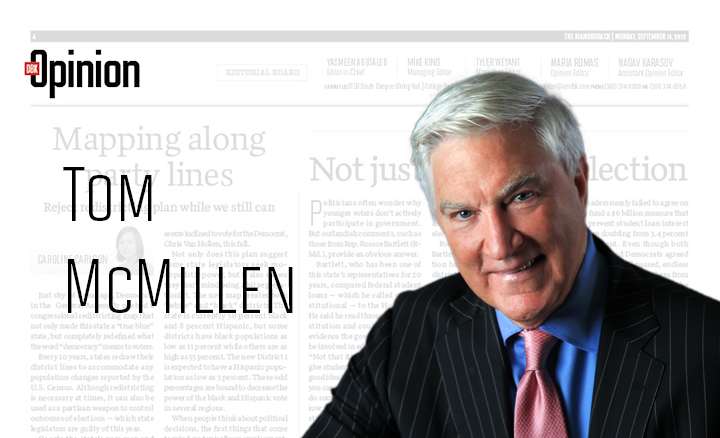
Board of Regents member
On most issues that come before the Board of Regents concerning our flagship campus, I fully support the administration. However, on the Big Ten move, I question the way the process was handled and believe I did not receive sufficient information to judge its merit.
First, there was no need to rush this important decision or come to it in such an exclusionary way. The Big Ten recruited this university two years ago and would certainly want us in the future. This university is the only big-time football and basketball program in the fourth-largest television market in the U.S. and effectively has a monopoly in the Baltimore-Washington region. The Big Ten needs this university to have access to that market and finalize a new TV contract, and we could have afforded to take our time.
The Board of Regents had a mere 18 hours to be briefed on the decision and provide our consent. We saw one piece of paper with revenue projections, but no forecasts about increased costs from facilities, salaries, travel, etc. We did not hear from a single voice that opposed the move. The Big Ten decision involves hundreds of millions of dollars and affects many stakeholders: students, student-athletes, fans and alumni, to name a few. What ethical message does it convey to our students when we make a decision driven largely by a need for money?
Second, when will our universities stop treating student-athletes like chattel? I strongly urge the university to remove all transfer restrictions on the freshman and sophomore student-athletes who will be affected by this move. I chose this university over hundreds of other schools primarily because my family would be able to see my games. How many families will be able to see their children play when this university’s teams are competing in Iowa and Minnesota? Yet student-athletes are locked into their scholarship agreements.
Third, an open and careful consideration of moving to the Big Ten could have provided the university with the opportunity to take a hard look at its athletic mission. The primary motivation for the move, supposedly, was that our athletic department was in dire financial shape, and we needed the Big Ten to provide financial sustainability.
But why were we so weak that we had to make a rushed decision to join the Big Ten? Was it because we spent nearly $4.5 million paying off departed coaches and buying out contracts to hire new coaches? Was it because we paid millions of dollars for guaranteed wins (i.e., when this university pays a weaker school to play, expecting it to lose)?
This university has struggled with the escalating money and arms race in college sports — so why should we believe the fundamental financial issues will not re-emerge? When my basketball coach, Lefty Driesell, came to this university, his yearly salary was $14,000, and he had two assistants. We have assistants at this university today who make 40 times what Lefty made. Both our football and basketball coaches have legions of assistants. Is this all needed? Basketball was pretty strong when I was in school — we always sold out Cole Field House — and our football program was one of the top programs in the ACC.
With the move to the Big Ten, how do we expect to keep up with Ohio State and Michigan in football? Will we pay our football coach $4 million like Ohio State does or spend millions on new facilities, which is one of the reasons we got into trouble in the first place? Can we truly believe any of the eliminated nonrevenue sports will have a long-term future, once the football program begins to suck up all of the available money?
I strongly believe Mark Turgeon and Randy Edsall will, over time, bring this university back to prominence in basketball and football. But in a new competitive environment with world-class football programs, a tougher recruiting environment and no legacy of good will, we have made their job much harder than if we had stayed in the ACC.
This university could have been a national leader in setting the standard for thorough and transparent deliberation of the positives and negatives of conference realignment. This was a monumental decision involving many of our stakeholders, and we lost the opportunity to debate these issues.
Tom McMillen is a Board of Regents member and former university student-athlete. He can be reached at ctm611@msn.com.



